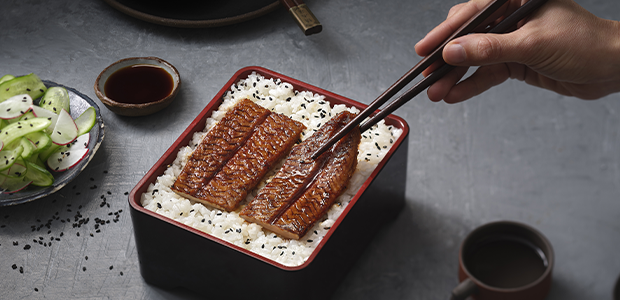
Forsea Unveils First Cultured Eel
Forsea Foods, a cell-cultured seafood startup, is advancing its mission to protect wild eel populations from the brink of extinction.
The company recently unveiled its first prototype of cell-cultivated freshwater eel, successfully replicating the traditional Japanese unagi eel (Anguilla japonica) with an authentic tender texture and rich, savoury flavour.
In a collaborative effort, Forsea Foods has partnered with renowned executive chef Katsumi Kusumoto to craft two classic Japanese dishes – unagi kabayaki (marinated grilled eel over rice) and unagi nigiri. Chef Kusumoto, who heads the vegan restaurant SAIDO in Tokyo, acclaimed as the world’s best vegan restaurant in 2019 by Happy Cow, brings his expertise to this venture.
Forsea Foods has reached a significant milestone with a functional proof-of-concept that mirrors the sensory qualities of real eel meat, setting the stage for an upscale production. This collaboration sees Forsea Foods contributing its innovative cell-cultivation technology for eel, while Kusumoto lends his culinary skills to enhance the product’s texture and taste. Forsea's innovative efforts were recognised when it won the Startup Pitch Hour Prize at the Asia-Pacific Agri-Food Innovation Summit in Singapore last October.
“Unagi is an enduring favorite in Japan,” informs Kusumoto. “Its timeless appeal, however, is impacted by a growing awareness among the Japanese population of the need to take a more sustainable approach. It’s been a thrilling journey to join forces with emerging innovators, and working together to deliver the traditional unagi indulgence with a clear eco-conscience.”
Founded in 2021, Forsea Foods embarked on a mission to reverse the declining trends of the ocean's seafood populations by innovating cell-cultivated alternatives. The overfishing of eels has led to their classification as an endangered species, primarily due to their status as a sought-after delicacy across Asia, Europe, and the US. This popularity has presented considerable challenges for suppliers, who grapple with meeting the escalating demand. Consequently, this situation has given rise to supply bottlenecks, illicit trading, and elevated prices for eel meat.
“This milestone marks a major leap in our journey to deliver delicious cultured seafood products,” claims Roee Nir, CEO and co-founder of Forsea. “Forsea is pioneering the fusion of traditional, high-quality Asian cuisine with groundbreaking technology to create the world’s first cultured unagi—one that will provide the consumer with a genuine seafood experience without putting further strain on aquatic life.”
Beyond its contribution to ocean conservation, Forsea’s cell-cultivated eel offers a nutritious alternative that is free from any antibiotics, hormones or ocean pollutants.
Forsea Foods' pioneering approach in culturing seafood is distinguished by its use of organoid technology. This technique involves creating 3D microtissues comprising both fat and muscle cells. These cells spontaneously differentiate into edible tissues, echoing the natural process of cell formation. A notable aspect of this method is that the cell lines self-organise into tissue structures without the need for external scaffold support, streamlining the production process and enhancing the scalability of the product.
This innovative approach is poised to address significant challenges in the industry, potentially alleviating supply constraints for eel meat. Moreover, Forsea's proprietary method enables more efficient and cost-effective production of cultivated meat, as it reduces the reliance on expensive growth factors.
Forsea is aiming for a commercial launch of its first product in 2025. The company is actively seeking strategic partnerships in Japan, the largest consumer of freshwater eel, and is also targeting rapidly expanding markets in Asia, the EU, and the US.

